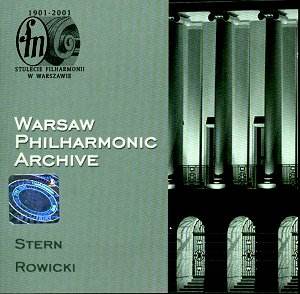The Warsaw Philharmonic
is releasing some intriguing performances
from its archive and I shall be reviewing
some of them in due course. The first
to hand is a Rowicki-led duo, the first
a muscular but controlled Coriolan overture
from 1954 – in decent sound – and the
second, the core, a Violin Concerto
with guest Isaac Stern recorded in June
1966. As an accompanist on record Rowicki
is best known for his many discs with
his compatriot Wanda Wilkomirska and
for a well-judged Rachmaninov Three
with Malcuzynski but it’s good to hear
him with Stern; he proves an astute
foil.
Stern had recorded
the Beethoven in New York with Bernstein
in 1959 and was to do so again with
the same orchestra under Barenboim in
1975. The Warsaw performance is full
of his charismatic strengths in this
work and full, too, of his unusual perception
in matters of architecture and construction.
In this he had few international peers;
with Stern the development, inter-relation
and fluidity of the work emerge with
remarkable logic. The sense that some
violinists cultivate here, of a supremely
lyrical second movement ultimately unrelated
to the surrounding ones never appears
with Stern. He has a gimlet eye for
structure. The Warsaw recording is rather
cold sounding – the timpani taps are
dead and hollow and there’s something
of a big echo once we are underway but
the audience is commendably quiet. Stern
is powerful in the opening movement,
utilising some intense fingertip vibrato
and expressive diminuendi to heighten
feeling – but there are few slides to
speak of. In the slow movement the clarinet
is very much to the fore and there is
as a result an interesting ensemble
perspective, if not an especially natural
one. Stern’s playing here is masculine
and somewhat aloof – the opposite of
the reposeful generosities of more feminine
interpreters – very different from say
Francescatti’s insinuating sweetness.
A problem is that the recording tends
to make him sound simply too loud, as
if he is consistently over projecting.
There is also a very bad if small patch
of tape wow (I’m not sure if the similar
problem at the end of the first movement
is Stern playing momentarily flat or
tape wow – I suspect the latter). There’s
drama without self-consciousness in
the finale and a strongly leonine cadenza
that exploits all Stern’s considerable
flair.
So this is a useful
adjunct to Stern’s commercial discography.
I wouldn’t recommend it above the known
recordings and those imperfections I’ve
noted above may prove troublesome but
Stern always had strong and important
things to say in this repertoire.
Jonathan Woolf

![]() for
details
for
details